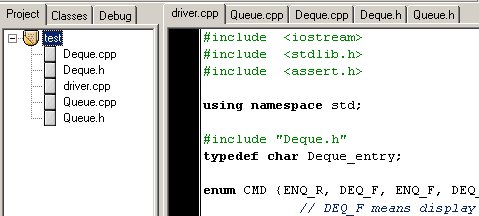Compile Multiple Files Dev C++
Nov 13, 2008 Best Answer: 1) Create a project file (which has an extension of '.dev'. I typically create this within the directory that the source files exist in already. 2) Right mouse-click on the project that you just created and opened. In the popup menu, choose the 'Add to.

The most basic multi-module monster project in C programming has two source code files. Each file is separate — written, saved, and compiled individually — but eventually brought together as one unit by the linker. The linker, which is part of the build process in Code::Blocks, is what creates a single program from several different modules.
- You can then separately compile the ``.c' files, and then link together to create an executable. In the next lesson we will look at Makefiles, which provide a more convenient way of compiling and linking multiple file programs.
- Online GDB is online compiler and debugger for C/C. You can compile, run and debug code with gdb online. Using gcc/g as compiler and gdb as debugger. Currently C and C languages are supported.
What’s a module?
A module is a source code file and its compiled object file. Together, the source code and object files are a module. Then the various object files are linked to build a program. The entire operation starts with separate source code files.
THE MAIN.C SOURCE CODE FILE
Exercise 1: Fire up a new project in Code::Blocks named ex2401. Create the project as you normally would: Type the source code from The main.c Source Code File into the editor as the contents of the main.c file. Save the file.
G++ Compile Multiple Files
Don’t build yet! After all, the code references the second() function, which doesn’t seem to exist anywhere. It’s prototyped, as is required for any function that’s used in your code, but the second() function is found in another module. To create that module in Code::Blocks, follow these steps:
Save the current project, ex2401.
Choose File→New→Empty File.
Click the Yes button when you’re prompted to add the file to the active project.
The Save File dialog box appears.
Type alpha.c as the filename and then click the Save button.
The new file is listed on the left side of the Code::Blocks window, beneath the Sources heading where the main.c file is listed. A new tab appears in the editor window, with the alpha.c file ready for editing.
Click the alpha.c tab to begin editing that file.
Type the source code from The alpha.c Source Code File into the alpha.c file in Code::Blocks.
Save the ex2401 project.
Build and run.
Vs Code C++ Multiple File
THE ALPHA.C SOURCE CODE FILE
Here’s the output you should see in the test window on your computer:
The two source code files aren’t “glued together” by the compiler; each source code file is compiled individually. A separate object code file is created for each one: main.o and alpha.o. It’s these two object code files that are then linked together, combined with the C standard library, to form the final program.
How To Compile Multiple Files In Dev C++
The main module for a multi-module C program is traditionally named main.c. That’s probably why Code::Blocks names the first (and, often, only) project source code file main.c.
Shaperbox vst cracked. Only source code files contained within the same project — found beneath the Sources branch — are linked together.
To compile and link source code files in a terminal window, use the following command:
This command compiles the source code files main.c and alpha.c, links together their object files, and then creates as output (-o) the program file ex2401.